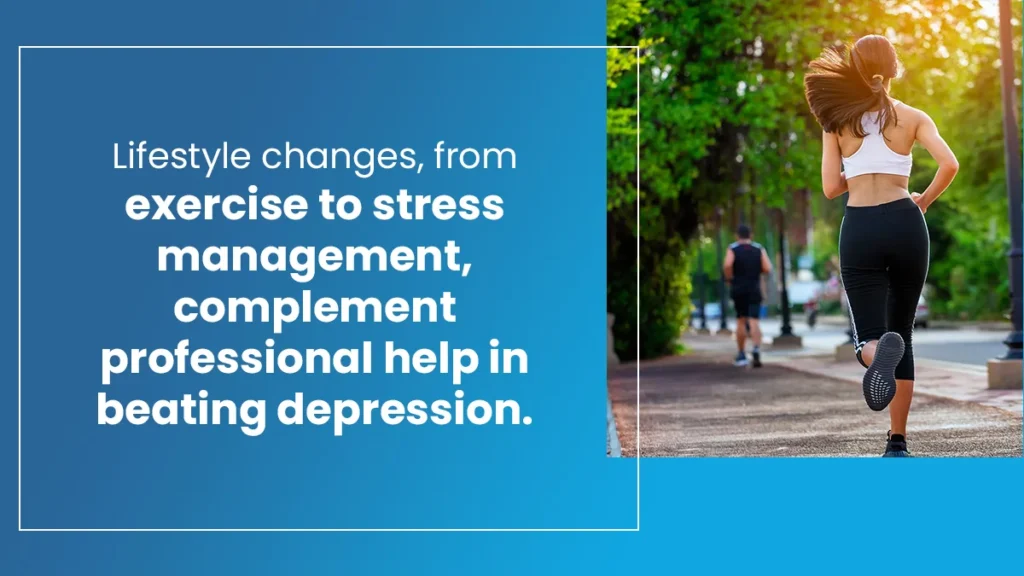Treating depression, a major depressive disorder and mood disorder, involves helping a person who feels down or sad. It can affect adults and children, impacting their mental and physical health.
Recognizing depression symptoms, like deep sadness or loss of interest, is crucial. Therapy, medication, and support from friends and family are common mental health treatments. It’s important to share feelings with someone you trust. Seeking professional help is a vital step toward feeling better.
Key Takeaways
Identifying depression symptoms is crucial for seeking timely help and support. Here’s what you need to know:
- Combining medication and support groups provides a holistic approach to managing depression.
- Lifestyle changes, from exercise to stress management, complement professional help in beating depression.
- Navigating daily life and setting achievable goals are vital aspects of living with depression.
The Haven Detox-New England can help you overcome depression. For more information, call us today at (844) 933-4145.

Understanding Depression
In 2021, approximately 14.5 million adults aged 18 or older have experienced at least one major depressive episode with severe impairment. Moreover, 5.7 percent of the adult population experienced the symptoms of depression, according to the National Institutes of Health. Within the same year, about 61.0 percent of adults with a major depressive episode sought treatment. For those facing major depressive episodes with severe impairment, around 74.8 percent received treatment.
These figures shed light on the prevalence of clinical depression, a serious mental disorder, among adults. Recognizing symptoms of depression is crucial, as it can manifest in various forms, ranging between mild and major depression, and may lead to suicidal thoughts. Seeking appropriate treatment, which may include drugs, is essential, but it’s also important to be aware of potential side effects.
Warning Signs of Major Depression
Depression, also known as clinical depression or major depression, can affect people of all ages, including teens and young adults. It has various types, such as psychotic depression and postpartum depression. Recognizing the symptoms is crucial for seeking help and support.
Emotional and Mental Symptoms
People experiencing a major depressive episode may feel overwhelming sadness, hopelessness, and a persistent cloud of negative thoughts. Suicidal thoughts, which are severe and require immediate attention, can also be a part of depressive symptoms. This disorder can make it hard for individuals to find joy in activities they once enjoyed, leading to a sense of emptiness.
Physical and Cognitive Symptoms
The impact of depression extends beyond emotions. Individuals may struggle with the physical effects of depression, such as changes in weight, sleep disturbances, poor diet, and low energy levels.
Cognitive symptoms include difficulty concentrating, making decisions, and feeling worthlessness. These challenges can make daily tasks seem more daunting.
Behavioral Symptoms
Depression often manifests in behavioral changes. People may withdraw from social activities, isolating themselves from friends and family. People with depression may struggle to keep up with work or family responsibilities.
Diagnosing Depression
Diagnosing depression involves a careful examination of a person’s mental and physical well-being. Identifying early signs is crucial for developing an effective treatment plan, especially in severe cases.
Psychological Evaluation
A clinical psychologist or mental health professional often conducts a psychological evaluation. That involves discussing feelings, thoughts, and behaviors. By exploring episodes of depression and their impact, helpful information is gathered to understand the nature and extent of the mental health problem.
In some cases, there might be an increased risk of the coexistence of addiction and depression, as individuals may turn to substances as a way to cope with their depressive symptoms. That may lead to dual diagnosis, requiring holistic treatment.
Physical Exam
In addition to a psychological evaluation, a physical exam is part of the diagnostic process. A healthcare provider may examine overall health and rule out any underlying medical conditions leading to depressive symptoms. Medical tests can provide valuable insights into the individual’s well-being.
Lab Tests
Lab tests, such as blood tests, may be conducted to assess various factors, including thyroid function, nutritional deficiencies, or the presence of addictive substances. Healthcare professionals inquire about substance use and address any associated issues.
These tests help ensure a thorough understanding of the individual’s health. It also helps healthcare providers to make a suitable diagnosis. Once diagnosed, different treatment options can be explored. These may include therapy, medication, or a combination of both. The choice depends on the individual’s unique needs and the nature of their depression.
Treatment Options to Overcome Depression
When facing depression symptoms, understanding the various treatment options available is essential for finding the right approach. Depression treatment often involves a combination of prescription drugs, psychotherapy, and support groups.
Medication
Antidepressant medication plays a crucial role in managing depressive symptoms. Different types of antidepressant drugs, such as selective serotonin reuptake inhibitors (SSRIs) or serotonin-norepinephrine reuptake inhibitors (SNRIs), aim to balance chemicals in the brain.
Doctors must discuss possible side effects and monitor hormone levels, especially in older adults. Such medical supervision helps to ensure the right drug with fewer side effects. Medics may recommend supplements like Vitamin D to those who experience seasonal affective disorder, which is a type of depression.
Psychotherapy
Psychotherapy, also known as talk therapy, involves talking about feelings and thoughts with a mental health professional. Cognitive behavioral therapy (CBT), a specific form of psychotherapy, helps individuals recognize and change negative thought patterns. This treatment approach is effective in treating depression and is also used in dialectical behavior therapy (DBT), which focuses on developing coping skills.
For specific cases, electroconvulsive therapy (ECT) might be considered, especially if other treatments haven’t been effective or in severe situations, such as a suicide attempt. ECT is generally safe and may have fewer side effects.
Support Groups
Support groups provide a valuable platform for individuals facing depression to share experiences and strategies for coping. They play an important role in fostering a sense of community and understanding.
Professional help, coupled with the shared experiences of others, can make a significant difference. Mental health support groups such as the National Alliance on Mental Illness (NAMI) offer their services nationwide. They help people overcome adversities in a welcoming environment.
Lifestyle Changes That Can Help Beat Depression
Depression is a complex challenge, and while professional help is crucial, incorporating positive lifestyle changes can complement treatment. Explore these holistic strategies to promote mental well-being.
Regular Exercise: Engaging in physical activity releases endorphins, contributing to improved mood and reduced symptoms, even in cases of severe depression.
Healthy, Balanced Diet: Nourishing the body with a balanced diet supports overall health, impacting mood and energy levels. Consider herbal supplements and dietary goals for added benefits.
Adequate Sleep: Prioritize quality sleep, establishing a routine to promote restful nights and manage severe symptoms effectively.
Reduction of Alcohol and Avoidance of Drugs: Limiting alcohol intake and avoiding drugs are essential in managing depression. Substance use can exacerbate symptoms, especially in severe cases.
Meditation and Stress Management Techniques: Incorporate mindfulness practices, such as meditation, to reduce stress. Stress management tactics play a vital role in alleviating severe depression symptoms.
While lifestyle changes can significantly contribute to reducing depression, it’s important to recognize the diverse nature of the condition. Professional help, including medications like tricyclic antidepressants if needed, remains fundamental, especially in cases of severe depression. By addressing lifestyle factors, individuals can take proactive steps toward regaining control over their lives and achieving lasting improvements in mental health.
Learning to Live With Depression
Living with depression is challenging, but learning to navigate daily life while managing symptoms is possible. Establishing routines can bring stability. Moreover, setting small but achievable goals helps build a sense of accomplishment.
Engaging in activities that bring joy, even in small doses, contributes to well-being—connecting with a support system, whether friends, family, or support groups, provides understanding and encouragement. Acceptance of the condition and seeking professional help play crucial roles.
Prioritizing self-care, including proper sleep and a balanced diet, forms a foundation for coping. By learning effective coping strategies and embracing support, individuals can find ways to lead healthy lives despite the presence of depression.
Frequently Asked Questions (FAQ)
What is the current best treatment for depression?
The best treatment for depression usually combines medicine and talking with a therapist. The medicine helps manage feelings, and talking therapy, like cognitive therapy, helps change negative thoughts.
Working closely with doctors is important to find the right plan for each person. That might include different kinds of therapy, depending on what works best for the individual.
How is medication used in the treatment of depression, and what are common side effects?
Medication helps manage depression by balancing chemicals in the brain. Common types include SSRIs or SNRIs. They can improve mood, but side effects like nausea or sleep changes may occur. It’s important to communicate side effects to the doctor for adjustments.
What are the best treatments for depression?
Effective depression treatments often combine medication and talk therapy. Antidepressants can help manage symptoms, while therapies like CBT address negative thoughts. Personalized plans, crafted by healthcare professionals, ensure tailored and practical approaches for each person’s unique needs.
Find Healing at The Haven Detox-New England
The Haven Detox-New England can move with you through depression. We offer holistic mental health treatment services that include therapy sessions with medications to alleviate your symptoms.
Our team of medical experts offers 24/7 medical care at residential treatment so you can focus on your recovery. Mental illness can also lead to addiction, and to combat that, we offer dual diagnosis treatment for long-term recovery. Call us today at (844) 933-4145 for more information about our programs.




